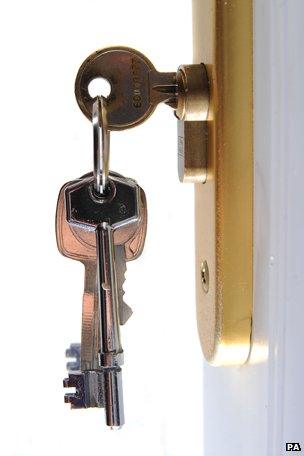Bank wants Help to Buy scaled back
- Published
- comments

I have learned that the governor of the Bank of England would like the Treasury to reduce the maximum size of loan that qualifies for a government-backed Help to Buy mortgage from £600,000 to perhaps £350,000 or £400,000.
I will explain why this matters in a bit. But first, here's a bit of general context.
There is a lot of talk here in Davos about how this era of cheap money has pumped up asset bubbles.
In the UK, as you know, that concern focuses on whether the housing market is overheating - which it may be doing in London and the south east of England.
All of which raises the question whether it is time for the price of money (interest rates) to start being gradually raised from its historically low level in most of the rich developed economies.
There is a related issue in the UK, which is whether the pace and nature of the economic recovery - driven to a considerable extent by household consumption - justifies a rise in interest rates.
My sense is that the Bank of England's Monetary Policy Committee is not united on this issue, that some members are moving to the view that a small increase in interest rates would be beneficial sooner rather than later.
There is a lot of gossip from informed sources to that effect - that the governor, Mark Carney, who has made it clear in recent months that he would rather keep interest rates at current exceptionally low levels for as long as possible, risks being outvoted.
Against that backdrop, I interpreted last night's interview with Carney, on BBC's Newsnight, as a sign that he fears he may not be able to stave off a rise in the policy rate in coming months.
Mark Carney spoke to Newsnight at the World Economic Forum in Davos
Because what stood out for me was his emphasis that as and when interest rates rise, those increases will be very small - implying an initial rise of a quarter of a percentage point.
This sounded like a concession to his more hawkish colleagues - those who favour an earlier rise in rates.
Which will not thrill the chancellor, George Osborne, who will want to be confident that the UK's recovery is firmly entrenched before there is any rise in rates.
There is however one thing the chancellor could do which could perhaps stave off an interest rate rise for a bit longer, and that would be to modify his Help to Buy mortgage support scheme.
As I have already mentioned, I am in no doubt that the governor of the Bank of England would like the maximum size of mortgage that qualifies for a Help to Buy loan reduced from £600,000.
The reason is that in doing so, the charge could no longer stick that the Help to Buy scheme is pumping up prices in London and south east England, which is the only part of the UK where there are signs of overheating in the housing market.
How so?
Well the appalling truth, which you know, is that there simply aren't that many low value properties in the capital and its environs. So reducing the maximum from £600,000 would mean that Help to Buy would see reduced take-up in that part of the country.
So those who favour pushing up interest rates to prevent a housing bubble, and in turn reduce both incipient inflation and possible financial instability, could be placated by a reduction of perhaps £200,000 or £250,000 in the maximum Help to Buy loan value.
Would such a modification be embarrassing for the Treasury and chancellor?
Probably only a bit.
Because in practice, Help to Buy is already having more impact outside London, where it is needed most, than inside London.
I know this based on data about its impact, passed to me by banking sources, who point out three things:
That the average value of Help to Buy loans is just under £150,000, which implies it is helping first time buyers and those on lower incomes
That around 80% of Help to Buy mortgages are for houses outside London and south east England, where in theory they are most needed
That so far there have been around £1bn of applications for Help to Buy loans, which implies that demand is good but not spectacular.
By the way, when I talk about Help to Buy, I mean specifically the second scheme, aimed at the second-hand market, not the original scheme to encourage house building.
Will the Treasury bite and reduce the maximum value to £350,000 or £400,000?
Well all I can say is that the Chancellor seems to be to show no sign of any waning in his admiration for Carney, so there is a fair probability he will heed his advice.
UPDATE 10:30
The Bank of England has given me this statement in response to my story on the Governor's position on Help to Buy:
"The assertion that the governor would like the Treasury to reduce the maximum size of loan that qualifies for a Help to Buy mortgage is completely without foundation."
For what it is worth, I stand by everything I wrote.